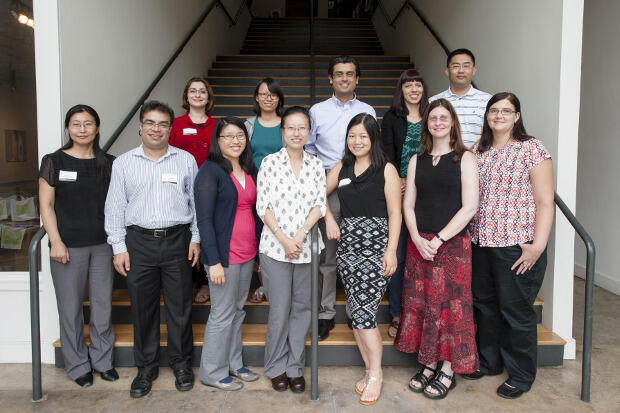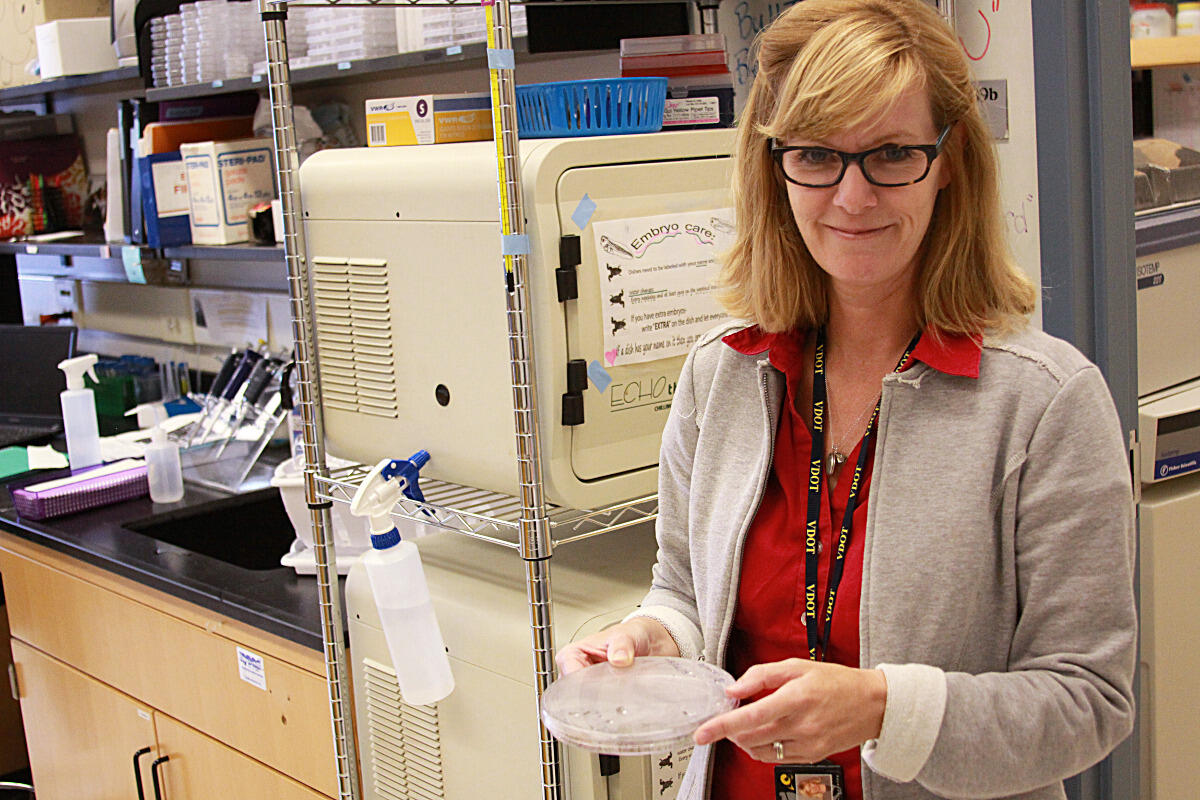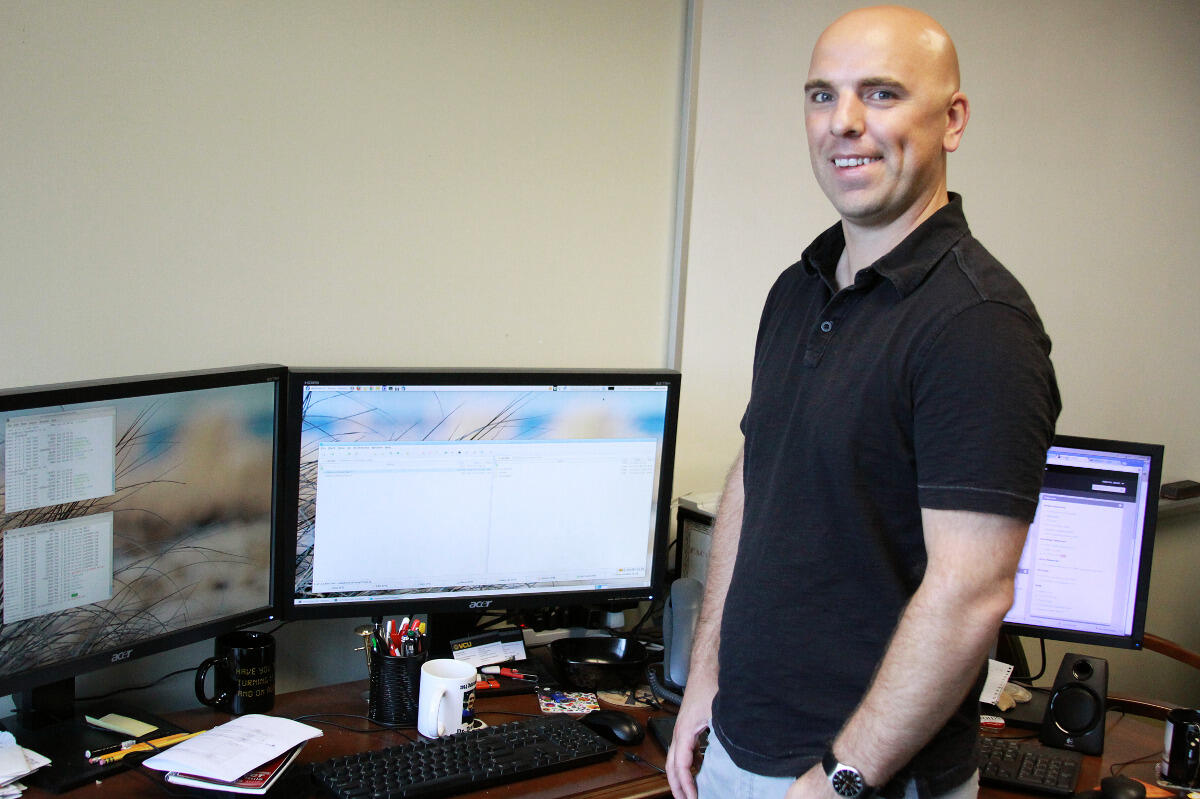
Front row, left to right : Hong Zhao, Ph.D., Reza Mohammadi, Ph.D., Christina Tang, Ph.D., Wenheng Zhang, Ph.D., Carol Fung, Ph.D., Bridget McInnes, Ph.D. and Heather R. Lucas, Ph.D.
Sept. 8, 2015
CAREER Academy supports ties between research and teaching for junior faculty
Share this story
A dozen junior faculty members are sharpening their grant-writing and communication skills — and learning more about how Virginia Commonwealth University can support researchers — during the CAREER Academy this academic year.
“The CAREER Academy is really, in a broader sense, about learning to be highly successful grant writers. We work with them all year long,” said Ann Nichols-Casebolt, Ph.D., senior associate vice president for research development in the Office of Research and Innovation.
This training program prepares faculty to submit grant proposals to the prestigious National Science Foundation Faculty Early Career Development (CAREER) Program. NSF CAREER awards “support junior faculty who exemplify the role of teacher-scholars through outstanding research, excellent education and the integration of education and research,” according to the funding agency.
VCU researchers have received eight of the grants, totaling $3.3 million, since 2010.
“The impetus for the CAREER Academy was that we felt like with the talent we have here at VCU, we should have more of these NSF CAREER grants,” Nichols-Casebolt said. This will be the second crop of participants in the CAREER Academy. The first was held in 2013, when 11 faculty members dove into the inaugural program. The CAREER Academy is one offering of the Office of Research and Innovation’s New Investigators Grant Writing Institutes initiative, which alternates focus each year.
The opening session and a reception were held at The Depot just before the start of fall classes.
“There’s a bond that we build and a momentum that’s established,” Francis L. Macrina, Ph.D., vice president for research and innovation, told current and past academy members in attendance.
This year’s participants are:
Natalie Baker, Ph.D., assistant professor, Program in Homeland Security and Emergency Preparedness, L. Douglas Wilder School of Government and Public Affairs.
Carol Fung, Ph.D., assistant professor, Department of Computer Science, School of Engineering.
Laleh Golshahi, Ph.D., assistant professor, Department of Mechanical and Nuclear Engineering, School of Engineering.
Ibrahim Guven, Ph.D., assistant professor, Department of Mechanical and Nuclear Engineering, School of Engineering.
Heather R. Lucas, Ph.D., assistant professor, Department of Chemistry, College of Humanities and Sciences.
Bridget McInnes, Ph.D., assistant professor, Department of Computer Science, School of Engineering.
Reza Mohammadi, Ph.D., assistant professor, Department of Mechanical and Nuclear Engineering, School of Engineering.
Christina Tang, Ph.D., assistant professor, Department of Chemical and Life Science Engineering, School of Engineering.
Wei-Ning Wang, Ph.D., assistant professor, Department of Mechanical and Nuclear Engineering, School of Engineering.
Qiong Zhang, Ph.D., assistant professor, Department of Statistical Sciences and Operations Research, College of Humanities and Sciences.
Wenheng Zhang, Ph.D., assistant professor, Department of Biology, College of Humanities and Sciences.
Hong Zhao, Ph.D., assistant professor, Department of Mechanical and Nuclear Engineering, School of Engineering.
Jessica Venable, coordinator of research development services in the Office of Research and Innovation, said this year’s cohort shares a common drive.
“We’re looking for a diverse and cohesive group committed to this year of hard work, in addition to their other responsibilities,” she said. “They all recognize that successful grantsmanship is a long slog.”
Monthly sessions will touch on a variety of topics, Nichols-Casebolt and Venable said. Participants will conduct peer reviews of each other’s projects, work with assigned mentors, take part in moderated mock reviews of proposals and have access to grant-writing resources and advice from prior participants.
The academy aligns with the NSF CAREER goal of tying together research and education.
“The best researchers are often the best teachers because they are on the cutting edge of their field,” Nichols-Casebolt said.
The best researchers are often the best teachers because they are on the cutting edge of their field.
A look inside VCU’s CAREER grants
Even as the semester starts, the Dickinson Lab on the third floor of the Eugene P. and Lois E. Trani Center for Life Sciences is hopping with activity. Undergraduates through post-docs are studying frog embryos, searching for clues about the development of the fetal mouth.

Amanda Dickinson, Ph.D., assistant professor in the Department of Biology in the College of Humanities and Sciences, received a $700,000 CAREER grant in 2014 for “Pulling the Mouth Open,” a study of molecular growth in the orofacial area.
“It’s the first opening between the gut and the external environment, so it’s not exactly what you think of as your mouth with jaws, a tongue and teeth,” she said. “But it’s essential to form the adult mouth and we know very little about how this little hole forms.”
“There’s a human health relevance, and there’s a really basic science: We need a mouth to eat,” Dickinson said. The formation of this opening may have an impact on Sudden Infant Death Syndrome and rare craniofacial problems in infants.
Tying together the lab and the classroom, her undergraduate students are analyzing data from the lab work. Graduate courses have also undertaken grant-related research projects.
Dickinson completed the CAREER Academy in 2013. She said the experience has given her an “essential support group” across campus.
“More than anything, it’s helped with other grants and networking [within] the university,” she said. The academy members “realized we were all at the same stage of our careers and of our lives. It provides support not only in science, but in life.”
Tomasz Arodz, Ph.D., assistant professor in the Department of Computer Science of the School of Engineering, also participated in the 2013 CAREER Academy. He received an approximately $175,000 CAREER grant this year to fund investigations “at the intersection of computer science and biology” at the Arodz Bioinformatics Lab.

“It’s algorithms for analyzing data, and bringing existing knowledge into that analysis. On the biology side, all those algorithms are applied to figure out how to predict how a patient, or a mouse, belongs to one group or another,” Arodz said. For instance, they could divide slow- or fast-healing wounds and seek the genetic answers of what is responsible for those differences.
While working with graduate and undergraduate students in the lab setting, he is also teaching a class on algorithms for machine learning, which he proposed in the grant.
“VCU is a very research-active institution, but to attract high-quality graduate students — which are really the foundation of any research — you have to have funds,” Arodz said. “It’s often tough for young professors to get funds to start with.”
“We have to do that extra step to help new faculty be competitive to get grants. It puts you in contact with the people to make it more seamless,” Dickinson said.
Receiving CAREER grants “puts us on the map” for prospective graduate students, who form the backbone of labs, Arodz said.
Dickinson agrees.
“It opens up a lot more opportunities for grad students and undergrads to do research,” she said.
The Class of 2015
Baker and Guven are among those hoping to sharpen their grant-writing and related skills through this year’s academy.
Guven and Baker both say integrating research and teaching is rewarding, for themselves and for students. They especially enjoy the different aspects of collaborating with student workers and lab assistants.
In a research environment, while you’re still teaching them, it has a team aspect. A family aspect.
“In a research environment, while you’re still teaching them, it has a team aspect. A family aspect. As a team, you’ll tackle the challenging questions together,” Guven said.
Baker, who studies social and cultural aspects of crisis and disasters, said funding for the social sciences can be difficult to secure.
“I think this is going to be an amazing resource,” she said. The program’s peer-review aspect is key.
“This is going to create long-lasting relationships. It’s transformative of my time at VCU,” Baker said. “It’s creating a way to interact with people who I wouldn’t normally.”
Guven’s research in computational modeling has applications “everywhere” and he hopes to one day oversee a Multidisciplinary University Research Initiative or research center.
“I use computers to simulate real-world events. How things break — that’s what I study,” he said. For instance, a defense or aerospace company might want to learn more about how a plane interacts with, and takes damage from, tiny objects it strikes in the atmosphere.
Professors are often experts in a relatively narrow field, so swapping ideas and proposals with people outside of those boundaries can help them write stronger grant proposals, participants and leaders say.
“That’s the root of the challenge we have. When we’re engaged in research, we can lose touch with how to paint a big picture,” Guven said. “I think today it became more solidified that this is not just CAREER. The benefits extend to any proposal that we write.”
Baker hopes her research can help policymakers, the media and citizens in times of crisis.
“We all want to change the world, right?” she said.
Subscribe to the weekly VCU News email newsletter at http://newsletter.news.vcu.
Subscribe to VCU News
Subscribe to VCU News at newsletter.vcu.edu and receive a selection of stories, videos, photos, news clips and event listings in your inbox.












